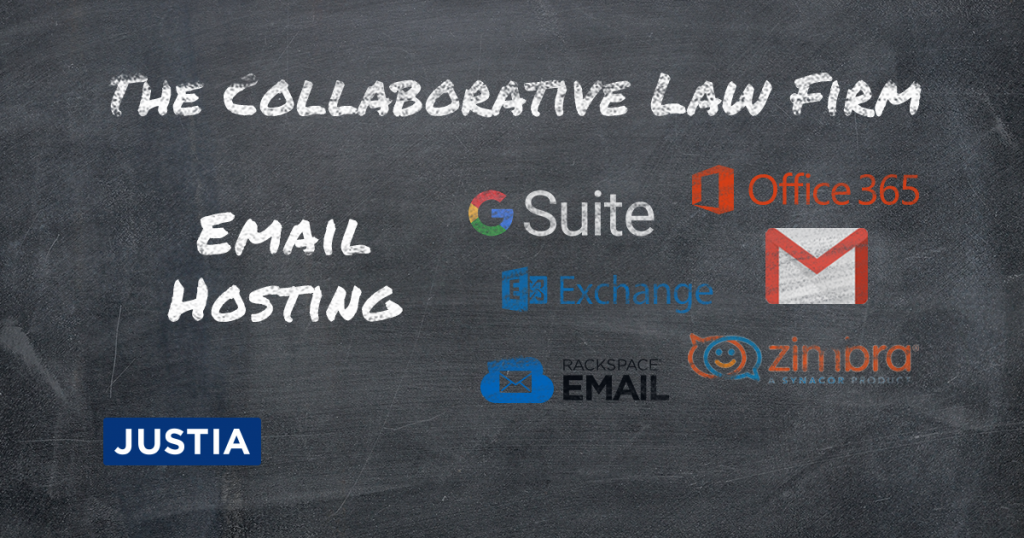We can’t send you updates from Justia Onward without your email.
Unsubscribe at any time.
We continue our series on services you can use in your firm to improve team collaboration with the most vital communications service there is, email. Check out our synopsis of your choices when it comes to your email.
Welcome to another installment of our Collaborative Law Firm series, where we cover different technological services used to foster intra-company collaboration and communication. In our first installment, we discussed instant messaging services, which organizations can use to facilitate instant, written communications among employees both local and remote. In our second installment, we compared several multi-user chat services, which are better suited for large groups needing to communicate both one-on-one and in groups simultaneously. Today we cover the single most important service companies use to communicate not only within the organization but also with their clients: email.
There are many email hosting solutions out there, so we will address the most common ones, starting with the easiest options and then the solutions with more customization options. There are two major categories of email hosting solutions: those not on your law firm’s domain, and those that are.
Email Addresses on Another Company’s Domain
The easiest and often most inexpensive email solution is to use an email address that is outside of your control. This can work seamlessly for many lawyers, especially those in small or solo practices who seek a more personal identity. The downside to this solution is that many see an email coming from aol.com, comcast.net, or even gmail.com as being less professional. It can also be difficult to find a memorable email address on a service that already has millions of users who have taken up all of the good names already. (Do you really want to be lawyer31492b@gmail.com?)
That said, it may still be a valid option for you, depending on the type of clientele your firm caters to. Here are a few options involving email addresses on another company’s domain.
Your Internet Service Provider Email
Let’s get this out of the way right away. Practically every Internet Service Provider (ISP) gives their customers a “free” email address as part of their service. Depending on your level of service, you may even get several accounts with your service. You may have even been required to make an email address at your ISP in order to be able to access services such as your ISP’s bill and control panel. As such, for many it is tempting to simply use the email address you already have. As a general rule, we recommend against using an email address from your ISP for a few reasons:
Vendor Lock-in
Building your professional identity with an email address ending in comcast.net may prove problematic if you ever decide to switch to a different Internet Service Provider for your internet access. After all, if you cancel your Comcast service, your email address will be deactivated and potential client messages to your Comcast email address will not get to you, potentially costing you lost business.
Sub-par Service
Email is not your ISP’s primary business, it is an afterthought, something they throw in extra along with the service that is their primary business, providing you internet access. As a result, the email webmail interface may be buggy or overly simplistic, the spam filters may be sub-par, and it may not work properly with your chosen email client.
Non-memorable Address
Email addresses have to be unique, there can be only one fred@comcast.net, and it probably isn’t you (especially if your name isn’t Fred). Finding an address that matches your identity can become difficult when all of the short memorable names are already taken. Now the flip side of this is, if it happens that you were Comcast’s first customer named Fred and you happened to get fred@comcast.net, having a short and memorable address at a well known domain may be almost brand-able in and of itself. Very often in order to get an email even close to your name you may have to add numbers to your username.
Unprofessional Address
As alluded to before, there are those who may see your @aol.com email address and infer that you are not tech savvy or sophisticated. Even if that assumption is unfounded, you only get one chance to make a first impression, and your email address may not be making the impression you want (especially if your address is also a non-memorable one).
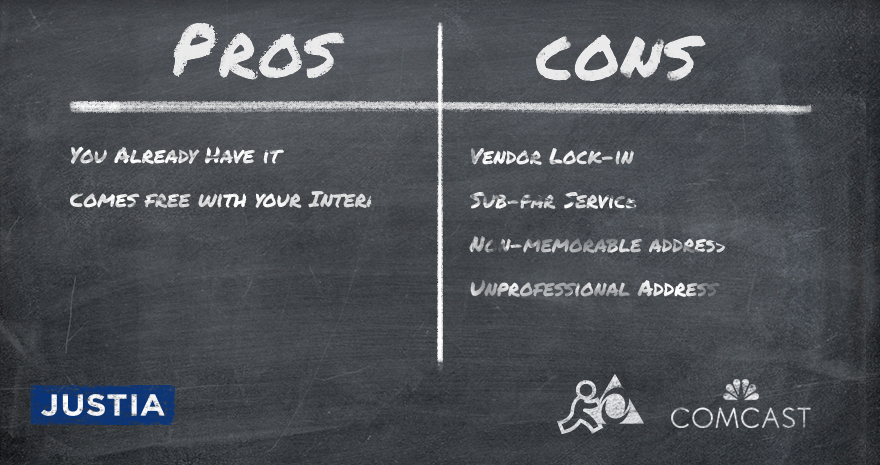
Free Email Providers
Several providers offer superior email services to the public. You may already be using one or more of these services if you have an @gmail.com, @yahoo.com or @outlook.com (formerly @hotmail.com) address. Because these types of accounts are free and not tied to your internet service, you can keep them when you change internet providers.
While vendor lock-in still exists, you can set-up filters to forward your messages to a preferred email address. You may still face the problem of finding a memorable and professional email address if you did not sign-up for an account early on.
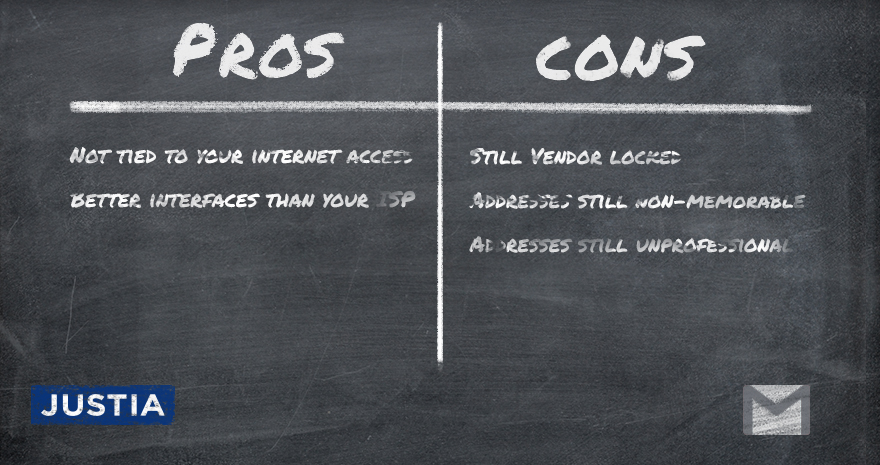
Email Addresses on Your Own Law Firm’s Domain
Attorneys seeking to present a more professional appearance should use an email account on their own law firm’s domain. This may be accomplished with an email forwarding account or a regular email account.
Email Forwarders
An email forwarding service is an option for attorneys who seek an email account on their own law firm domain, but do not want to deal with the complexity of configuring a full email hosting platform. The advantage offered by email forwarding services is that they are often easy to configure. Several popular domain registrars, including eNom and GoDaddy, offer free email forwarders along with your domain. To set up a forwarder, all you typically have to do is give your registrar both the address you want to create at your domain and the email address you have elsewhere for it to forward to. Your provider will then resend inbound email messages to your preferred email address. However, email forwarding works only one way. While someone can email you at your alias, your replies will come from your real email address.
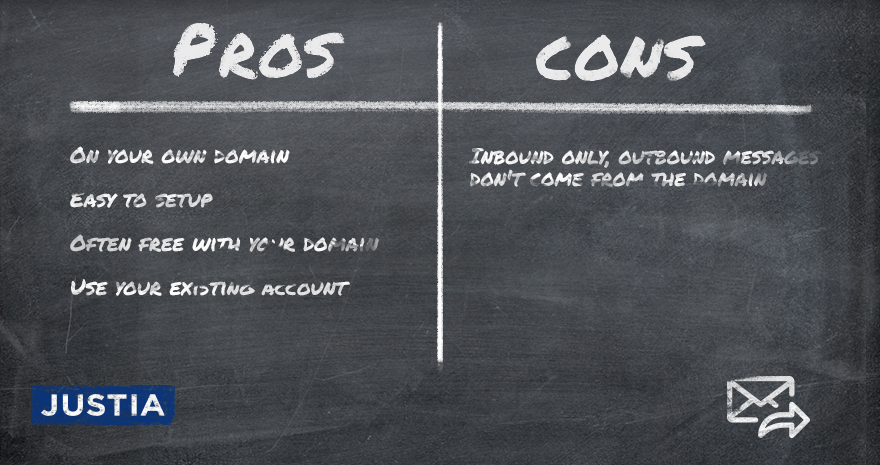
Email Hosting
If you want to make the most of professional email at your own domain, you’ll need a full email hosting service. Here are a few recommended email services that will work great on your domain name.
Google GSuite
If you already like GMail and the rest of Google’s services, such as Google Docs, Google Drive and Google Calendar, you should consider Google’s G Suite, a version of Google’s services specifically designed for business.
In addition to email on your own domain, G Suite offers an advanced set of collaboration tools including file storage with Google Drive, calendaring with Google Calendar, documents, spreadsheets, and more.G Suite offers in three service levels. G Suite Basic includes 30GB of storage per account for $5/user/month. (Note: in April 2019, this price will be increased to $6/user/month). If you required more storage or need more advanced features like eDiscovery tools, G Suite Business offers unlimited storage and additional services for $10/user/month. (In April, this will go up to $12/user/month). Finally, G Suite Enterprise adds enhanced security, controls and customization for $25/user/month.
You can see a description of what is included with each plan here.
The Email interface for G Suite is the same as GMail, so if you like GMail, you’ll love being able to use GMail with your own domain.
In addition to the GMail web interface, you can also enable IMAP (Internet Message Access Protocol) or POP (Post Office Protocol) support so that you can access your email on a traditional email client such as Mozilla Thunderbird, Apple Mail or Microsoft Outlook.
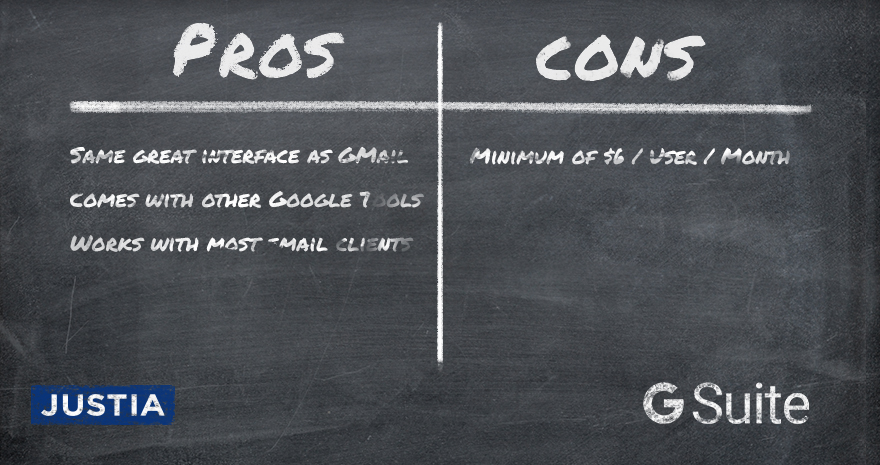
Office 365
If you prefer using Microsoft Office applications, you may be more comfortable using Microsoft Office 365. Office 365 is a subscription to Microsoft Office and includes the familiar suite of applications Word, Excel, Powerpoint and Outlook as well as online file storage and email service that is designed for Outlook.
Like GSuite, there are 3 different versions of Office 365 for business subscriptions, but be careful, the cheapest plan ($5/user/month) and the most expensive plan ($12.50/user/month) includes email hosting, the medium plan ($8.25/user/month) only includes the Microsoft Office applications and does not come with email service.
- The Essentials plan ($5/user/month) includes just email hosting and some web apps, it does not include desktop Office applications.
- The Business plan ($8.25/user/month) is just for the desktop applications without email.
- The Premium plan ($12.50/user/month) includes both.
If you need email, be sure to go with either the Essentials plan if you don’t need Word and Excel, or the Premium plan if you do.
Each Office 365 email account includes 50GB of email storage.
If you prefer to use a desktop application, The outlook.com email hosting that comes with Office 365 is designed specifically to work with the Microsoft Outlook email application.
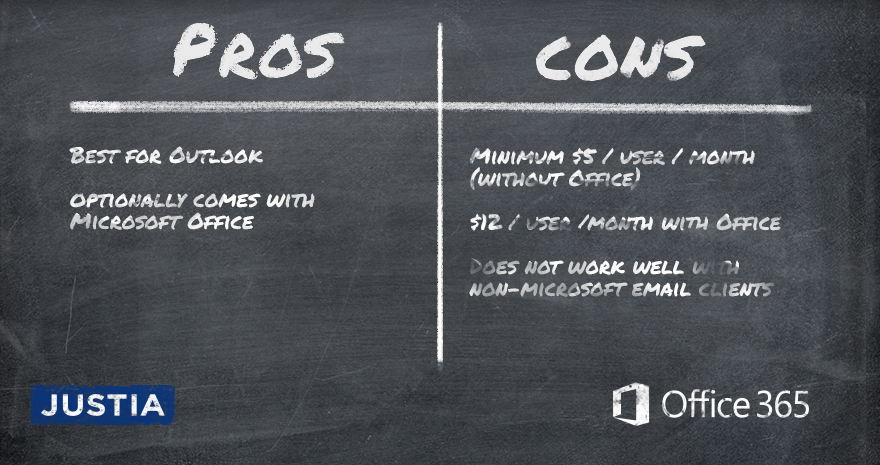
Rackspace Email
Another email provider we often recommend is Rackspace Email Hosting. Rackspace offers a more traditional email service which is designed to work with either a webmail application or a desktop email client such as Thunderbird, Apple Mail or Outlook.
Rackspace Email doesn’t come with an office suite of applications, but if you already have an office suite otherwise, email may be all you need anyway.
Rackspace email is priced as low as $2/user/month with a 5 user minimum ($10/month minimum).
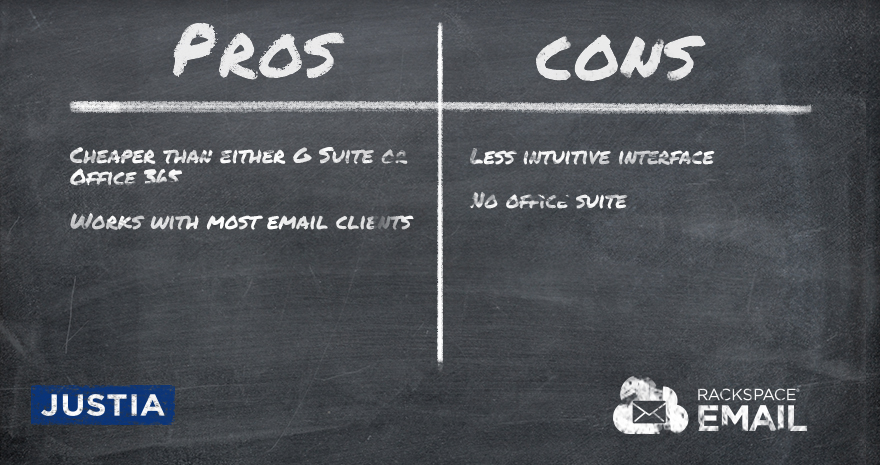
Host It Yourself
As we did in our previous articles, we wanted to give you some options for hosting your own email yourself. Note that since you are likely using your email to communicate with people outside your firm, in order to ensure deliverability you may have to do quite a bit to get things setup properly. We recommend you partner with an experienced local IT consultant if you want your email hosted within your firm.
Microsoft Exchange
If you are hosting a Microsoft Windows Server in your law firm’s office, you can host your own email using Microsoft Exchange server.
Like with Office 365 hosted service, Exchange Server is designed specifically for the Microsoft Outlook email application, and it does not work well with other email clients, but if you use Outlook as your email application of choice, using either Exchange or Office 365 will give you the best user experience.
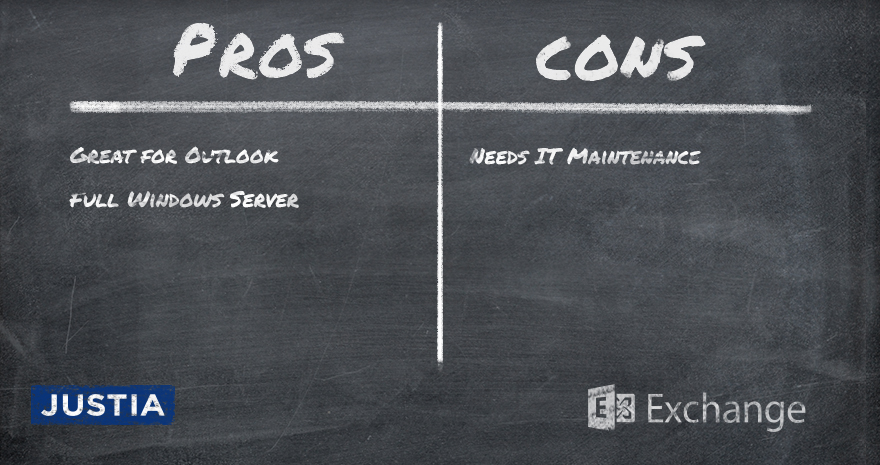
Zimbra
If you would like an open source option that you can host yourself, Zimbra has long offered a full suite of email, calendaring and collaboration tools that you can install yourself. Zimbra was built on the shoulders of giants and brings together a number of open source applications from other providers and adds their own glue to connect them together.
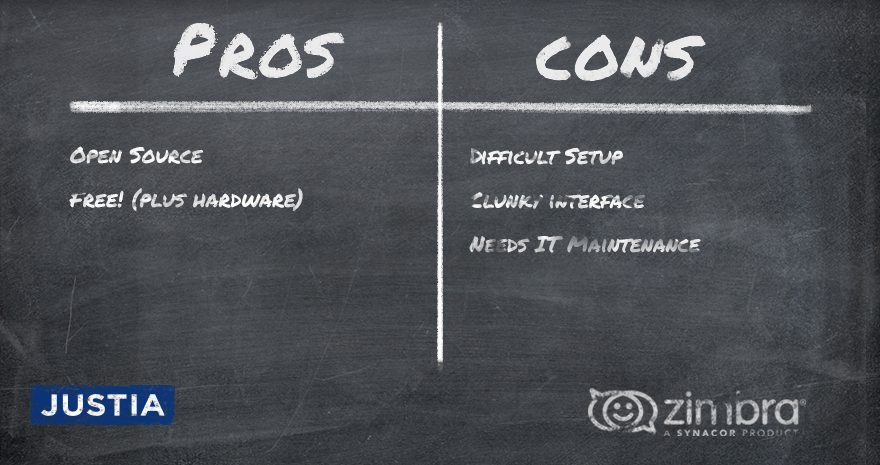
Wrapping Up
That’s about it for this edition of the Collaborative Law Firm. We hope you found this helpful when thinking of how you want to setup your email for your law firm. No matter which method you use, we recommend you setup SPF and DKIM email authentication as we mentioned in our article about spam filtering. Keep your eyes peeled here for future articles about how you can boost your collaboration game in your firm.
